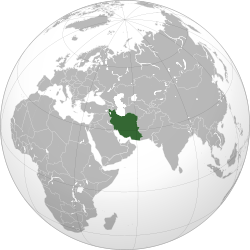Iran Says Doesn’t ‘Intend’ To Enrich Uranium Above 20%
By Iran Review
Head of the Atomic Energy Organization of Iran (AEOI) Fereydoun Abbasi says Iran has no intention of enriching uranium above the 20 percent level.
Abbasi said that Iran started producing 20 percent enriched uranium when it could not obtain fuel for Tehran Research Reactor from the international market due to the sanctions imposed against the country.
The head of AEOI said most of Iran’s enrichment activities are conducted at the 3.5 percent level but added that in the future, Tehran will determine its uranium enrichment level according to its needs.

The Iranian official added that the objective of 20 percent enrichment is to produce radiopharmaceuticals, but certain parties are trying to connect Iran’s nuclear activities to non-civilian purposes.
Head of the Atomic Energy Organization of Iran has also revealed sabotage operations at Iran’s Fordow nuclear facility in August just ahead of a scheduled visit by International Atomic Energy Agency (IAEA) inspectors.
“On Friday August 17, 2012, power lines running from the city of Qom to Fordow facility were cut using explosives. It should be reminded that power outage is a way of damaging centrifuge machines. In the early hours of the following day, [IAEA] inspectors demanded a snap inspection of the facility,” Dr. Fereydoun Abbasi said.
“Isn’t there any connection between the visit and the blast? Who else could have quick access to the facility other than IAEA inspectors to register and report dysfunctions?” he asked.
“In another case, a similar incident happened along the road to Natanz facility. Due to the transparency of our peaceful nuclear [energy] program and the IAEA’s supervision, we have tried to purchase our required articles from the world markets. IAEA does not help us with the lifting of sanctions. Perhaps they have no duty in this regard. However, when the Stuxnet virus is used [by Iran’s enemies] … or explosives are stashed in the devices, they give truthful and honest reports on the number of centrifuge machines, exact mass of the uranium … and everything else which is visible in the vicinity,” he said.
Abbasi went on to warn the UN nuclear watchdog against the infiltration by “terrorists and saboteurs.”
“We must make director-general of IAEA and his colleagues aware of this issue and give the necessary warning to them.”
The official said those who planned to strike Iran’s nuclear facilities understood through IAEA reports that they had failed.
The head of Iran’s nuclear body also said Tehran will hold the International Atomic Energy Agency (IAEA) responsible for a possible attack by Israel and the US on the country’s nuclear facilities.
Director of the Atomic Energy Organization of Iran (AEOI) Fereydoun Abbasi noted how some institutions gain access to the information that Iran provides to the IAEA before UN Nuclear Chief Yukiya Amano presents them at the IAEA General Conference.
“Normally the reports are never circulated; especially, those which are provided to the Board of Governors and General Conference. But we have realized that even prior to the reports of IAEA chief Mr. Amano to the General Conference, some institutes gain access to the information,” Abbasi stated.
“If Mr. Amano ignores our request for not disclosing our data, he will be held accountable for possible damage inflicted on Iran’s facilities, be it by a terrorist act or a military operation,” he warned.
The Iranian official further pointed out that most institutions work for Zionists and that Iran has seriously called on Amano to stop offering such reports to the General Conference.
“Amano should be more responsible in this regard, particularly in a situation where some countries are hostile to Iran,” the AEOI chief stated.
Abbasi noted that in response to Iran’s good-will gesture in cooperating with IAEA inspectors, the agency should urge countries hostile to Iran to stop resorting to terrorist acts that jeopardize the nuclear security of the Islamic Republic.
The International Atomic Energy Agency (IAEA) has put on its agenda Iran’s motion to implement a series of reforms within the policymaking structure of the agency, Tehran’s ambassador to the IAEA said.
Ali Asghar Soltanieh pointed to Iran’s efforts to propose the reforms at the agency over the past years.
“Before the commencement of the conference, through a letter to the Director General of the Agency [Yukiya Amano], I called for inclusion of a paragraph about reforms in policymaking and decision-making structure of the agency on the agenda of the conference,” he added.
Soltanieh stated that on the first day of the conference, the paragraph was adopted at the general assembly through consensus and the issue was therefore put on the agenda of the conference.
The Iranian ambassador argued that due to serious shortcomings within the policymaking and decision-making system of the Agency and limitations on the number of Board of Governors’ members it is necessary to reform the policymaking structure of the international body.
Iran’s Ambassador to the International Atomic Energy Agency has also denounced the UN Security Council’s inaction on nuclear activities of the Israeli regime over the past decades.
Soltanieh said the Israeli regime’s existence is based on occupation, killing, oppression, aggression and threat, IRNA reported.
“The possession of atomic weapons by such a regime will raise international concern by a hundred times,” he added.
Iran’s permanent envoy to the IAEA urged the international community to adopt a measure against the Israeli regime’s nuclear program.
He emphasized that the Israeli regime is the only obstacle in the way of establishing a zone in the Middle East free of nuclear weapons.
Soltanieh stressed the importance of implementing the global demand for Tel Aviv to join the nuclear Non-Proliferation Treaty (NPT), saying the Israeli regime’s nuclear facilities should be monitored by the IAEA’s comprehensive safeguards.
